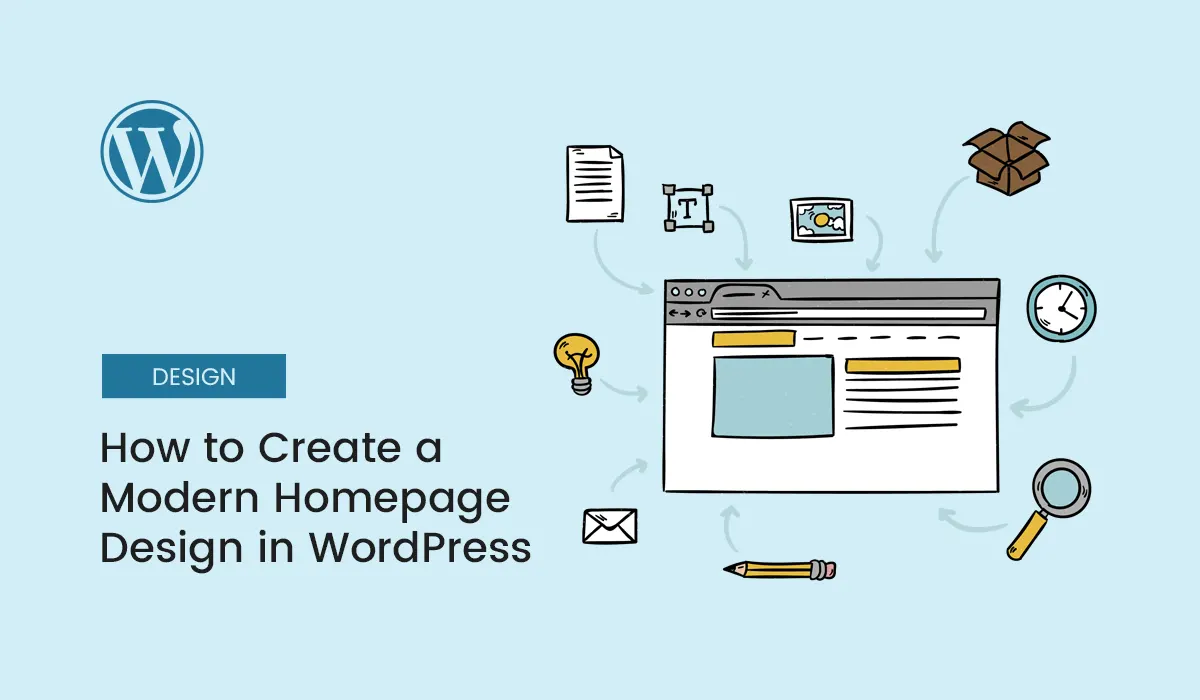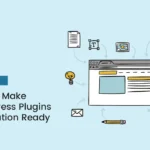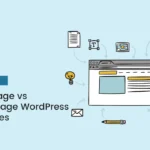Introduction
Your homepage is the digital front door to your website. It’s the first impression visitors get, and in today’s fast-paced online world, that impression matters. A modern homepage design is not just about looking good — it’s about usability, speed, and clear communication of your brand or content.
If you’re building a blog, business site, or online portfolio, WordPress gives you full flexibility to create a stylish and functional homepage without coding. In this guide, you’ll learn how to create a modern homepage design in WordPress step by step, using free tools, themes, and page builders.
Why a Modern Homepage Design Matters
- First Impressions Count – Visitors form an opinion of your site within seconds.
- Better Engagement – A clear, modern layout keeps people browsing longer.
- Conversions – A well-structured homepage can guide users to sign up, shop, or contact you.
- SEO Boost – User-friendly design reduces bounce rates and improves rankings.
Elements of a Modern Homepage Design
Before we jump into the how-to, let’s outline the essentials of a modern homepage:
- Clean Navigation – Simple menus that don’t overwhelm.
- Hero Section – A strong headline, subheadline, and call-to-action above the fold.
- Visuals – Use quality images, videos, or animations.
- Content Blocks – Break information into digestible sections.
- Social Proof – Testimonials, reviews, or logos of featured clients.
- Call-to-Action (CTA) – Buttons that guide users toward your goal.
- Mobile Optimization – Ensure a seamless experience on smartphones.
Step 1: Choose the Right WordPress Theme
Your theme sets the foundation for your homepage design.
Recommended Free Themes for 2025
- Astra – Lightweight, flexible, and great for page builders.
- GeneratePress – Fast, minimal, and SEO-friendly.
- Kadence – Advanced design options with a modern look.
- Blocksy – Fully compatible with Gutenberg and Full Site Editing.
- Neve – Great starter templates for different industries.
👉 Tip: Choose a theme that’s responsive, customizable, and compatible with Elementor or Gutenberg.
Step 2: Decide Between Gutenberg or a Page Builder
You have two main options for designing your homepage in WordPress:
Option 1: Gutenberg (WordPress Block Editor)
- Built into WordPress (no extra plugin).
- Lightweight and fast.
- Perfect for simple, minimal designs.
Option 2: Page Builders (Elementor, WPBakery, Kadence Blocks)
- Drag-and-drop editing.
- Pre-built templates and widgets.
- Better for complex, highly customized designs.
👉 Recommendation: Beginners should use Elementor Free or Gutenberg for modern and clean homepage design.
Step 3: Set a Static Homepage in WordPress
By default, WordPress shows your latest blog posts on the homepage. To create a modern static homepage:
- Go to Dashboard > Settings > Reading.
- Choose “A static page”.
- Select a page you’ve created (e.g., “Home”) as your homepage.
- Save changes.
Step 4: Structure Your Homepage Layout
Here’s a proven homepage layout that works in 2025:
1. Hero Section (Above the Fold)
- Large background image or gradient.
- Headline that communicates your value.
- Short subheadline with benefits.
- CTA button (e.g., “Get Started” or “Contact Us”).
2. About/Introduction Section
- Short paragraph introducing who you are or what your brand does.
- Supporting image or video.
3. Services/Features Section
- 3–4 columns highlighting key offerings.
- Icons or small graphics for visual appeal.
4. Social Proof
- Testimonials, reviews, or brand logos.
- Builds trust instantly.
5. Content/Portfolio Section
- Showcase latest blog posts, projects, or products.
- Use grid-style layouts for modern design.
6. CTA Section
- Bold background color with a call-to-action.
- Example: “Join 10,000+ readers. Subscribe now!”
7. Footer
- Navigation links, contact details, and social media icons.
- Keep it clean and minimal.
Step 5: Add Modern Design Elements
To make your homepage feel 2025-ready, use these design tricks:
- White Space – Give elements room to breathe.
- Bold Typography – Use modern Google Fonts like Inter, Poppins, or Montserrat.
- Minimal Color Palette – Stick to 2–3 brand colors.
- Subtle Animations – Elementor motion effects or Gutenberg block animations.
- Responsive Design – Always preview on mobile and tablet.
Step 6: Use Plugins to Enhance Design
Enhance your homepage with free plugins:
- Elementor Free – Drag-and-drop design.
- Spectra or Kadence Blocks – Gutenberg block add-ons.
- Smash Balloon Social Feed – Display social media feeds.
- Slider Revolution (paid) – Advanced sliders and hero sections.
- WPForms Lite – Add contact or signup forms.
Step 7: Optimize for Performance
Even the best homepage design won’t work if your site is slow. Optimize with:
- LiteSpeed Cache or WP Rocket – For caching.
- Smush or Imagify – For image optimization.
- Cloudflare CDN – For global speed.
- Minimal plugins – Only install what you need.
Step 8: Test and Iterate
Once your homepage is live, test it:
- Check load speed (GTmetrix, PageSpeed Insights).
- Mobile testing on multiple devices.
- A/B testing for different CTAs or layouts.
- Gather feedback from real users.
Examples of Modern Homepage Designs
Here are homepage styles you can replicate in WordPress:
- Minimalist Blog – Clean typography, lots of white space, focus on text.
- Business Homepage – Hero section, services, testimonials, CTA.
- Creative Portfolio – Grid-style projects with hover effects.
- E-commerce Store – Featured products, discounts, social proof.
- Personal Brand – Large hero image, short bio, newsletter signup.
Conclusion
A modern homepage design can transform your WordPress site into a professional, engaging, and conversion-friendly platform. By choosing the right theme, structuring your layout, and adding modern design elements, you can create a homepage that impresses visitors and drives results.
The best part? With WordPress in 2025, you don’t need coding skills — just creativity and the right tools.
Ready to impress your visitors? Start building your modern homepage design in WordPress today and create a site that truly stands out in 2025!



